Simplifying Bookkeeping: Essential Tips for Dentists
Running a successful dental practice involves more than just being a good dentist. You also need to take care of your money. Keeping track of your finances and managing your payroll are important, but they can be complicated and take up a lot of time.
With accurate records and keeping track of your money, you’ll be on top of things like taxes, have enough cash to keep the office running, and be able to make smart choices about your practice, like buying new equipment or hiring more staff.
As a dentist, your time is valuable and should be spent on treating your patients well. That’s why it’s important to simplify your financial tasks. In this article, we’ll explain the basics of bookkeeping and give you essential tips and methods to help you make your financial tasks easier. We’ll talk about everything from choosing the right accounting software to outsourcing your financial tasks. By following these tips, you’ll be able to improve your financial management and focus on providing good dental care to your patients.
What is Bookkeeping?
Bookkeeping is like having a detailed diary for your dental practice’s financial activities. It’s all about jotting down every penny that comes in (like payments from patients) and every penny that goes out (like paying bills for supplies or staff salaries). Basically, it’s keeping track of all the money-related things happening in your practice.
Now, let’s talk about bookkeeping versus accounting. Think of bookkeeping as the groundwork, like laying bricks for a house. It’s about recording every financial move and keeping things organized day-to-day.
On the flip side, accounting is like taking those bricks and building a whole house. Accountants use the info from bookkeeping to analyse how your practice is doing financially. They look at stuff like how much money is coming in, how much is going out, and how profitable your practice is. They also help with smart money decisions and making sure you’re all good with taxes.
So, in short, bookkeeping is like keeping track of the score by writing down every money move. And accounting is taking that score and figuring out what it all means for your practice’s financial health.
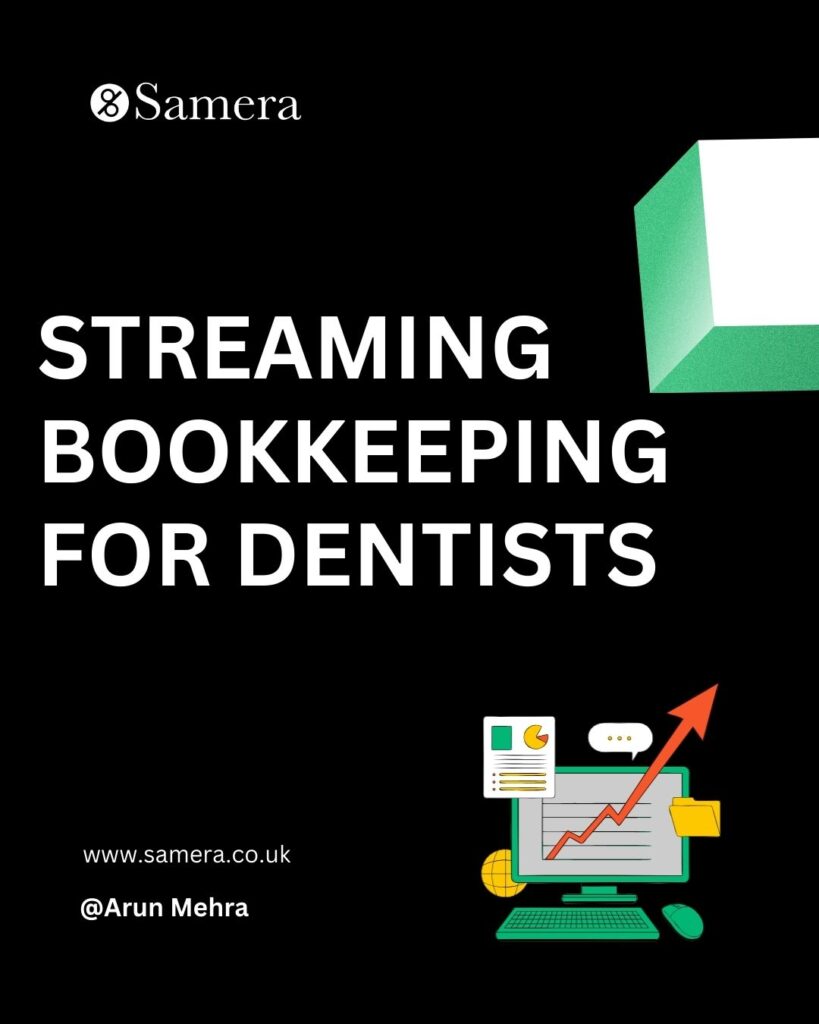
The Bookkeeping Process Explained
Conducting bookkeeping for your dental practice involves several key steps:
- Choosing a System: With recent changes in UK tax and accounting laws, it is now required that you use an automated, digital accounting software. This software has to be compliant with the Making Tax Digital regulations. Systems like Xero and Quickbooks are some of the more well known.
- Recording Transactions: It’s crucial to track income and expenses daily to maintain accurate financial records. This includes recording payments from patients, insurance reimbursements, supplier invoices, payroll expenses, and any other financial transactions related to the practice. Daily tracking ensures that no transactions are overlooked and provides real-time insight into the practice’s financial health.
- Categorizing Expenses: Proper expense categorization is essential for generating accurate financial reports and analysing spending patterns. Dentists should categorize expenses into relevant categories such as office supplies, rent, utilities, payroll, equipment maintenance, and marketing. Consistent categorization makes it easier to track and manage expenses and ensures compliance with tax regulations.
- Reconciling Bank Statements: Dentists should regularly reconcile their bank statements with their bookkeeping records to verify accuracy and identify any discrepancies. This involves comparing the transactions recorded in the bookkeeping system with those listed on the bank statement and investigating any discrepancies. Reconciliation ensures that all transactions are accounted for and helps detect errors or unauthorized charges.
- Generating Reports: Dentists should regularly generate basic financial reports such as income statements and balance sheets to assess the practice’s financial performance and position. Income statements provide an overview of revenue and expenses over a specific period, while balance sheets summarize the practice’s assets, liabilities, and equity. These reports help dentists track profitability, monitor cash flow, and make informed financial decisions to support practice growth and sustainability.
By following these steps, practice owners. can effectively conduct bookkeeping for their dental practice, ensuring accurate financial records, compliance with regulations, and informed decision-making to achieve long-term success.
The Importance of Simplified Bookkeeping and Payroll for Dentists
As a dental practice owner, it’s crucial to understand your practice’s finances and follow the rules for the dental industry and the UK’s tax codes. Here’s why:
- Informed Financial Decisions: Accurate bookkeeping provides dentists with a clear picture of their practice’s financial health, enabling them to make informed decisions about important investments such as equipment purchases and staffing levels. By understanding their revenue streams and expenses, dentists can allocate resources effectively to support the growth and efficiency of their practice.
- Payroll Management: Managing payroll is equally important for dentists. As a business owner, you have legal responsibilities to your employees, including making accurate payroll calculations, making timely payments, and complying with labor laws. By simplifying your payroll process, you can ensure that your staff are paid correctly and on time, reducing the risk of disputes or legal complications.
- Accurate Tax Filing: Proper bookkeeping ensures that dentists maintain detailed records of income, expenses, and deductions, facilitating accurate tax filing. By staying organized throughout the year, dentists can minimize their tax liabilities and avoid penalties or audits from tax authorities.
- Practice Profitability: Through diligent bookkeeping, dentists can track practice profitability by analysing revenue, expenses, and profit margins. This insight allows them to identify areas for improvement, optimize operational efficiency, and maximize profitability over time.
- Cash Flow Management: Effective bookkeeping helps dentists manage cash flow by monitoring incoming revenue and outgoing expenses. By staying on top of cash flow, dentists can ensure they have sufficient funds to cover operational expenses, such as payroll and supplies, and maintain financial stability even during periods of fluctuating income.
- Insurance Payments and Patient Billing: Bookkeeping also plays a crucial role in managing insurance payments and patient billing. By accurately recording insurance reimbursements and patient payments, dentists can track outstanding balances, follow up on unpaid invoices, and maintain strong financial relationships with insurance providers and patients.
In summary, improved accounting and payroll are essential for dentists to ensure financial stability, compliance with regulatory requirements, and efficient practice management. By paying attention to these aspects of your business, you can streamline your operations, reduce stress, and allocate more time to delivering excellent dental services to your patients.
In the following sections, we will explore practical tips and strategies to help you simplify your accounting and payroll processes, empowering you to take control of your dental practice’s financial well-being.
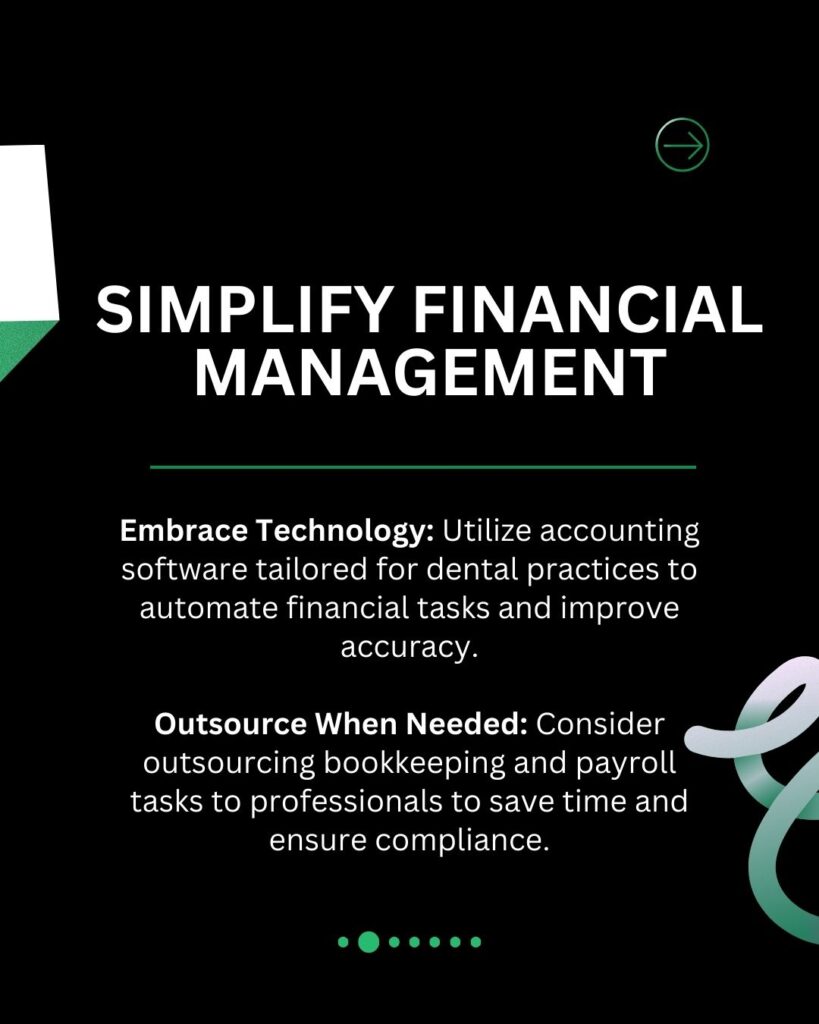
Understanding the Specific Bookkeeping and Payroll Requirements for Dentists
As a dentist, it’s important to know the unique financial rules that apply to your job. Dental practices have their own money-related considerations that are different from other businesses. Being aware of these details will make it easier to manage your finances.
One crucial thing to think about is the money coming in and going out. In dentistry, you might have various sources of income, like patient fees, payments from government healthcare programs, and insurance payments. It’s essential to keep accurate records of all these income sources for proper financial reporting.
Dental practices also have various expenses, such as staff salaries, dental supplies, equipment maintenance, and rental costs. Keeping detailed records of these expenses will not only help with accurate financial reports but also identify areas where you can save money and plan your budget.
Besides income and expenses, dentists need to follow the rules set by organizations like the General Dental Council (GDC) and HM Revenue and Customs (HMRC). These organizations have specific requirements for record-keeping and tax obligations. Failing to meet these requirements can lead to penalties and legal problems. So, it’s crucial to stay updated on the latest rules and make sure your financial processes follow the necessary guidelines.
To simplify your financial management as a dentist, consider using specialized accounting software designed for dental professionals. These software solutions often have features that cater to the unique needs of dentists, such as tracking lab fees, managing patient records, and generating reports tailored to the dental industry. Implementing such software can streamline your financial processes, save you time, and reduce the chances of errors.
By understanding the specific financial requirements for dentists, you can ensure accurate financial records, compliance with regulations, and more efficient management of your dental practice’s finances. Improving these processes will not only save you valuable time and effort but also contribute to the overall success and stability of your dental business.
Action points
- Identify Income Sources: List all the ways your practice generates income (patient fees, insurance, government programs).
- Track Expenses by Category: Separate your business costs into categories (salaries, supplies, equipment, rent) for better budgeting.
- Research GDC & HMRC Regulations: Look up the latest record-keeping and tax requirements from the GDC and HMRC to ensure compliance.
Click here to learn more about Making Tax Digital for dentists.
Choosing the Right Accounting Software for Efficient Record-keeping
Choosing the right accounting software is crucial for dentists to maintain efficient record-keeping practices. Thanks to technology advancements, dentists have various options to choose from, each with its own unique features and benefits.
First, it’s important to consider your dental practice’s specific needs. Look for accounting software designed for healthcare professionals, offering features like invoicing, expense tracking, and payroll management. This ensures you have a comprehensive system that can handle all your financial and payroll requirements.
Another important factor to think about is how easy the software is to use. As a dentist, you may not have extensive accounting knowledge or experience, so it’s essential to choose user-friendly software that is easy to navigate. Look for features like a simple interface, clear instructions, and helpful customer support to make the transition to using the software smooth.
Integration capabilities are also worth considering when selecting accounting software. Look for software that can seamlessly work with other systems you use in your dental practice, such as appointment scheduling or patient management software. This will save you time and effort by eliminating the need for manual data entry and ensuring that all your systems work together smoothly.
Security should be a top priority when choosing accounting software. As a healthcare professional, you handle sensitive patient information, so it’s crucial to pick software that prioritizes data security and confidentiality. Look for software that offers encryption, regular data backups, and strong access controls to protect your financial and patient data.
Finally, consider your budget when selecting accounting software. There are both free and paid options available, so it’s important to weigh the features and benefits against the cost. While free software may be tempting, keep in mind that paid options often offer more robust features and better customer support.
By carefully considering these factors and choosing the right accounting software, dentists can streamline their accounting and payroll processes, saving time and ensuring accurate financial records for their practices.
Action points
- Consider your dental practice’s specific needs, such as features like invoicing, expense tracking, payroll management, and integration with other systems.
- Choose software that is easy to use and navigate, with a simple interface, clear instructions, and helpful customer support.
- Prioritize data security by choosing software that offers encryption, regular data backups, and strong access controls.
- Consider your budget when weighing the features and benefits against the cost.
- Free software may be tempting, but keep in mind that paid options often offer more robust features and better customer support. We recommend looking into Xero and Sage.
Did You Know?
- Dentists in the UK must keep accurate financial records for all business transactions. This requirement is set out in the General Dental Council (GDC) Standards for Dental Professionals (2019), which state that dentists must “keep accurate and up-to-date records of all your financial transactions, including income and expenditure.”
- Dentists in the UK must deduct tax and National Insurance contributions from their employees’ salaries. This is required by the Income Tax (Earnings and Pensions) Act 2003 and the National Insurance Contributions Act 2010.
- Dentists in the UK must submit VAT returns to HMRC quarterly. This requirement is set out in the Value Added Tax Act 1994.
- Dentists in the UK must submit payroll information to HMRC monthly. This requirement is set out in the Pay-as-You-Earn (PAYE) Regulations 2003.
- Dentists in the UK must also submit an annual tax return to HMRC. This requirement is set out in the Income Tax (Self Assessment) Act 1996.
Click here to watch our webinar on automating your finances with Xero.
Organizing and Categorizing Expenses for Easy Tracking and Tax Purposes
When it comes to handling the money side of your dental practice, organizing and sorting your expenses is important for easy tracking and tax purposes. Keeping your expenses clear and properly categorized helps you stay organized and ensures you’re taking advantage of all eligible tax deductions.
To make this process easier, start by setting up a system to record and categorize your expenses. This can be as simple as using a spreadsheet or investing in accounting software designed for small businesses. Make sure to create categories that match the tax rules in the UK, such as office supplies, equipment, professional services, and marketing expenses.
To stay on top of your expenses, establish a regular schedule for recording and categorizing them. Allocate dedicated time each week or month to review your receipts, invoices, and financial documents. This will help you identify any missing or undocumented expenses and ensure that everything is accurately categorized.
In addition to organizing and categorizing expenses, it’s essential to keep all relevant documents in a reliable and easily accessible place. This includes receipts, invoices, bank statements, and any other financial records. Having these documents readily available will make it easier for you to provide accurate information during tax season and any potential audits.
By focusing on the organization and categorization of expenses, you’ll simplify your accounting and payroll processes and ensure compliance with tax regulations. This will give you peace of mind and allow you to focus on providing quality dental care to your patients.
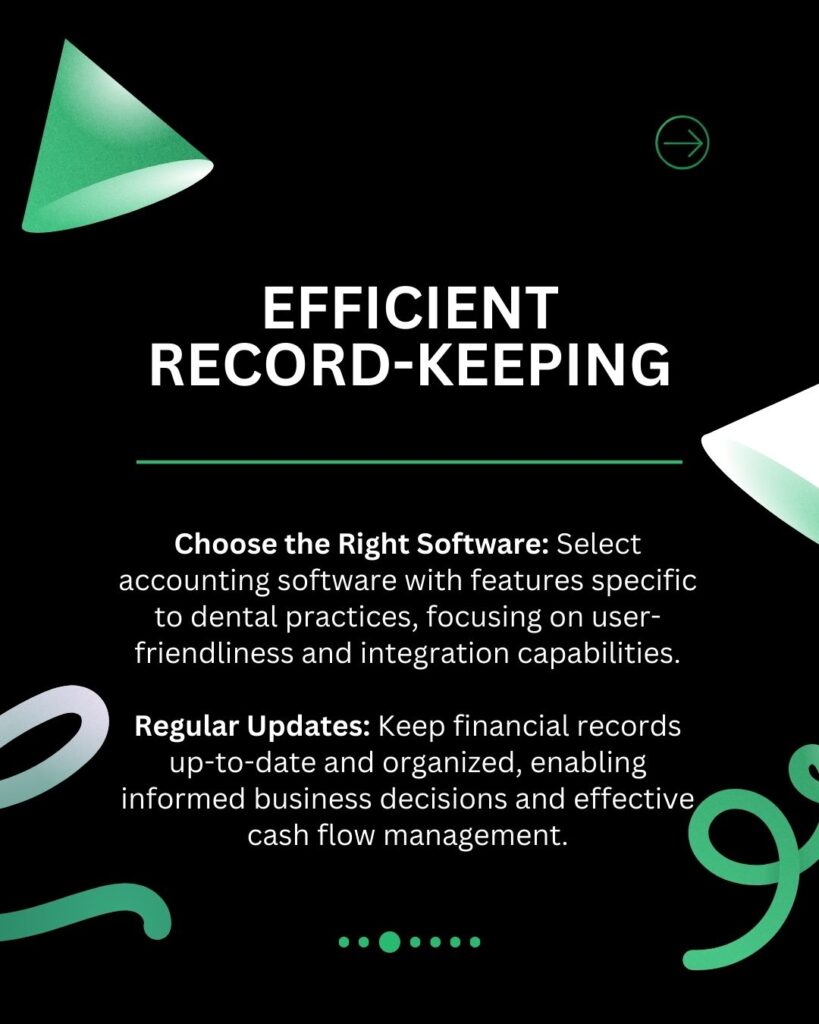
Action points
- Set up a system to record and categorize your expenses, such as using a spreadsheet or accounting software.
- Create categories that match the tax rules in the UK, such as office supplies, equipment, professional services, and marketing expenses.
- Establish a regular schedule for recording and categorizing expenses, such as each week or month.
- Keep all relevant documents in a reliable and easily accessible place, such as receipts, invoices, bank statements, and other financial records.
Click here to read our guide on expenses for dentists.
Streamlining Payroll Processes for Dental Staff
As a dentist, managing the payroll for your dental staff can be a time-consuming task. However, streamlining your payroll processes can help you save time and ensure accuracy in your financial records. Here are some basic tips to improve your dental staff payroll:
- Use payroll software: Invest in reliable payroll software designed specifically for small businesses. This software can automate various payroll tasks like calculating wages, deductions, and tax payments. It will also generate pay stubs for your dental staff, making the process more efficient and error-free.
- Create a consistent payroll schedule: Establish a consistent payroll schedule, such as bi-weekly or monthly, and clearly communicate it to your dental staff. This will help them know when they will be paid, reducing any confusion or inquiries.
- Implement direct deposit: Encourage your dental staff to sign up for direct deposit, where their wages are electronically transferred directly into their bank accounts. This eliminates the need for physical checks, reduces the risk of loss or theft, and saves time on manual check distribution.
- Maintain accurate employee records: Keep detailed records for each dental staff member, including personal details, tax information, and employment contracts. This ensures that you have all the necessary information readily available for payroll calculations and reporting.
- Stay updated with payroll regulations: Payroll regulations and tax rules can change frequently. It’s important to stay informed about any updates that may affect your dental staff’s wages and deductions. Consider consulting with a professional payroll service provider or an accountant to ensure compliance with the latest regulations.
- Automate tax calculations and filings: Tax calculations can be complex, especially when considering deductions and allowances specific to the dental industry. Use payroll software that can automatically calculate taxes based on the latest tax rates and rules. Additionally, consider automating your tax filing process to ensure timely and accurate submissions.
By implementing these tips, you can streamline your dental staff payroll processes, reduce administrative burdens, and ensure accurate financial records for your dental practice. Simplifying accounting and payroll will not only save you time but also contribute to the overall efficiency and success of your dental business in the UK.
Action points
- Invest in payroll software designed specifically for small businesses.
- Establish a consistent payroll schedule and communicate it to your staff.
- Encourage your staff to sign up for direct deposit.
- Keep detailed records for each staff member.
- Stay updated with payroll regulations and tax rules.
- Automate tax calculations and filings.
Click here to learn more about our payroll services.
Implementing Automated Systems for Accurate and Timely Payments
Using automated systems for accurate and timely payments can be a great benefit for dentists. Managing finances and payroll can often be time-consuming and prone to mistakes, leading to unnecessary stress and financial difficulties.
By using automated systems, dentists can streamline their payment processes and ensure that employees and suppliers are paid correctly and on time. This not only saves valuable time but also helps maintain positive relationships with staff and vendors.
One effective way to implement automated systems is by using accounting software specifically designed for dentists or small businesses. These software solutions are tailored to the unique needs of dental practices, offering features like automated payroll calculations, invoice generation, and expense tracking.
With the help of such software, dentists can easily input employee hours, track leave entitlements, and calculate deductions for taxes and benefits. This eliminates the need for manual calculations and reduces the risk of errors in payroll processing.
Moreover, automated systems can integrate with online payment platforms, allowing dentists to electronically pay suppliers and contractors. This ensures prompt payments and provides a convenient and secure method for financial transactions.
Additionally, automated systems can generate detailed reports and summaries, providing dentists with valuable insights into their practice’s financial health. These reports can help identify areas for cost savings, track revenue streams, and monitor overall efficiency.
In summary, implementing automated systems for accurate and timely payments is a crucial step in simplifying accounting and payroll for dentists. By embracing technology and streamlining financial processes, dentists can focus more on providing quality dental care while ensuring the financial stability of their practice.
Action points
- Use accounting software specifically designed for dentists.
- Input employee hours and track leave entitlements to automate payroll calculations.
- Integrate with online payment platforms to electronically pay suppliers and contractors.
- Generate detailed reports and summaries to monitor financial health and identify areas for improvement.
Click here to learn more about how to organise your dental practice finances.
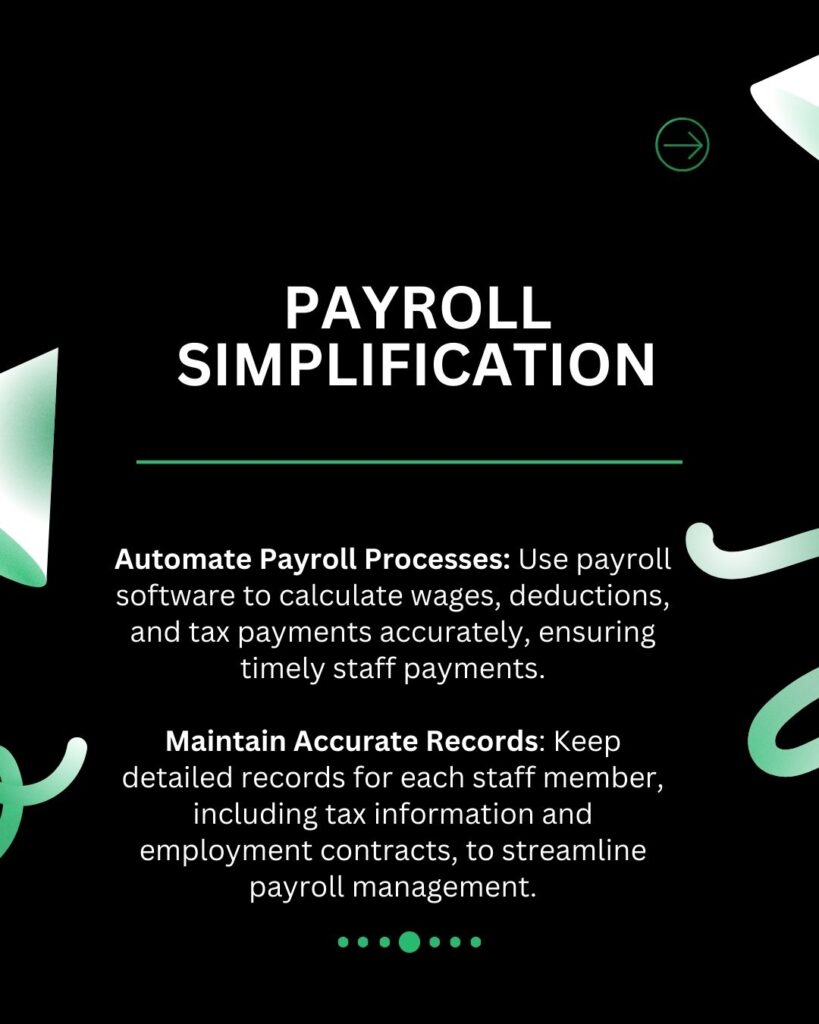
Staying Compliant with HMRC Regulations and Reporting Requirements
Staying in line with HMRC (His Majesty’s Revenue and Customs) rules and reporting requirements is important for dentists in the UK. As the owner of a dental practice, it’s your responsibility to make sure that your financial and payroll processes follow the specific rules set by HMRC.
One of the first steps to stay compliant is to register your dental practice with HMRC. This will allow you to get a Unique Taxpayer Reference (UTR) number, which is essential for all tax-related communication.
Next, you need to establish a strong accounting system that accurately records all financial transactions and keeps the necessary documents. This includes keeping track of income, expenses, invoices, receipts, and any other important financial records.
Staying updated with payroll regulations is also crucial. This involves correctly categorizing your dental staff as employees or self-employed contractors and ensuring that their wages are calculated accurately, including any deductions for taxes and national insurance contributions.
In addition to accurate record-keeping, you must also meet reporting requirements set by HMRC. This includes submitting timely and accurate VAT returns, payroll information, and annual tax returns. Failure to meet these obligations can result in penalties and potential legal issues.
To simplify the process, consider using advanced accounting and payroll software designed specifically for dentists. These tools often come with features that automate calculations, generate detailed reports, and remind you of important deadlines.
Staying compliant with HMRC rules might seem overwhelming, but with proper organization and the right tools, you can streamline your financial and payroll processes, ensuring that you meet all requirements and avoid any unnecessary penalties.
Action points
- Register your dental practice with HMRC and get a Unique Taxpayer Reference (UTR) number.
- Establish a strong accounting system that accurately records all financial transactions and keeps the necessary documents.
- Stay updated with payroll regulations and correctly categorize your dental staff as employees or self-employed contractors.
- Ensure that your dental staff’s wages are calculated accurately, including any deductions for taxes and national insurance contributions.
- Meet reporting requirements set by HMRC by submitting timely and accurate VAT returns, payroll information, and annual tax returns.
- Consider using advanced accounting and payroll software designed specifically for dentists to automate calculations, generate detailed reports, and remind you of important deadlines.
Click here to watch our webinar on managing your dental practice accounts.
Outsourcing Bookkeeping and Payroll Tasks to Professionals
Outsourcing accounting and payroll tasks to experts can be a big advantage for dentists. As a dentist, your main focus should be on providing top-quality dental care to your patients. However, administrative tasks like accounting and payroll can be time-consuming and take away valuable hours from your practice.
By outsourcing these tasks to professionals, you can free up your valuable time to concentrate on what you’re good at – serving your patients. Professional accounting and payroll services have the skills and knowledge to handle all the financial aspects of your dental practice efficiently and accurately.
One of the significant benefits of outsourcing is that you can rely on the expertise of professionals who specialize in accounting and payroll for dentists. They understand the unique financial challenges and regulations that dental practices face, ensuring compliance with tax rules and regulations specific to the industry.
Moreover, outsourcing these tasks can help you save money in the long run. Instead of hiring an in-house accountant or payroll expert, which comes with additional costs like salaries, benefits, and training, outsourcing allows you to pay for the services you need on a contractual basis. This can significantly reduce your overhead costs and improve your practice’s financial health.
Additionally, outsourcing accounting and payroll tasks can give you a sense of peace of mind. You can trust that professionals will handle your financial records and transactions accurately and securely, maintaining confidentiality and data protection. This can alleviate the stress and anxiety associated with managing these sensitive aspects of your practice on your own.
In summary, outsourcing accounting and payroll tasks to professionals is a smart move for dentists. It allows you to focus on patient care, ensures compliance with industry-specific regulations, saves money, and provides peace of mind. Consider partnering with a reputable accounting and payroll service provider to improve your practice’s financial management and streamline your operations.
Action points
- Identify a reputable accounting and payroll service provider that specializes in working with dentists.
- Review their services and pricing to ensure that they meet your specific needs and budget.
- Schedule a consultation to discuss your requirements and expectations.
- Sign a contract that outlines the services to be provided, the fees, and the termination terms.
- Provide the service provider with the necessary access to your financial records and systems.
- Review the service provider’s work regularly and provide feedback to ensure that your needs are being met.
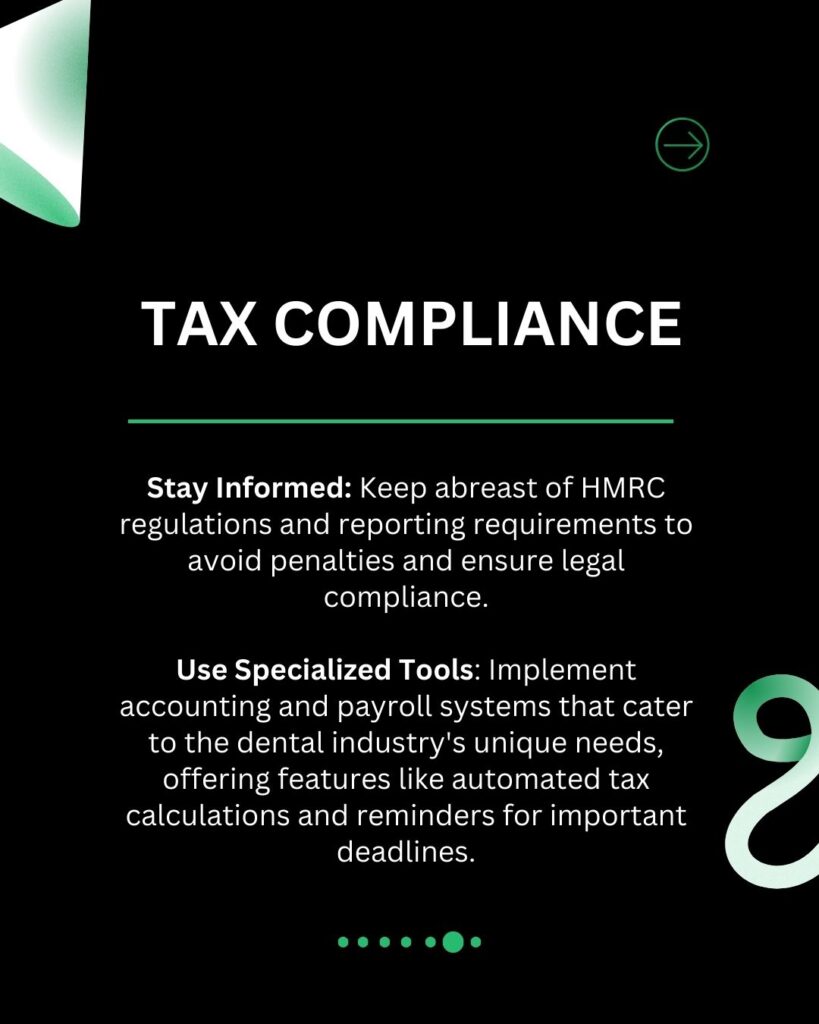
Click here to book a free consultation about outsourcing your bookkeeping and accounts.
Tips for Maintaining Accurate and Up-to-Date Financial Records
As a dentist, it’s crucial to maintain accurate and up-to-date financial records for the success of your practice. This not only ensures compliance with legal and regulatory requirements but also provides a clear picture of your practice’s financial health.
Here are some simple tips to help you streamline your accounting and payroll processes and ensure accuracy in your financial records:
- Use accounting software: Invest in reliable accounting software designed for small businesses or dental practices. These tools can automate many aspects of accounting, such as tracking income and expenses, creating invoices, and generating financial reports. They also provide a secure platform to store and access your financial data.
- Separate business and personal finances: It’s essential to maintain separate bank accounts and credit cards for your dental practice. Mixing personal and business finances can lead to confusion and make it challenging to accurately track and categorize expenses. Keep all business-related transactions separate to maintain clarity in your financial records.
- Regularly reconcile accounts: Reconciliation involves comparing your financial records with bank statements to ensure accuracy and identify any discrepancies. This process helps catch errors, detect fraudulent activity, and maintain the integrity of your financial data. Set aside time each month to promptly reconcile your accounts and address any discrepancies.
- Track expenses diligently: Keep a record of all your operating expenses, including supplies, equipment, rent, utilities, and professional fees. Use categories or expense codes to accurately match and categorize expenses. Maintaining a detailed record of your expenses allows you to identify areas where you may reduce costs and improve profitability.
- Stay on top of invoicing and payments: Timely and accurate invoicing is crucial for maintaining a steady cash flow. Establish a system to generate and send invoices promptly to your patients or insurance company. Monitor outstanding payments and follow up on any overdue invoices. Consider offering convenient payment options, such as online payments, to streamline the collection process.
- Seek professional assistance: If managing accounting and financial tasks becomes overwhelming, consider hiring a professional accountant or bookkeeper with experience in the dental industry. They can ensure your records are accurate, assist with tax planning, and provide valuable financial insights to support the growth of your practice.
By implementing these tips, you can simplify your accounting and payroll processes, maintain accurate financial records, and focus more on providing excellent dental care to your patients. Remember, effective financial management is the foundation for a successful and thriving dental practice.
Action points
- Use accounting software designed for small businesses or dental practices.
- Separate business and personal finances.
- Regularly reconcile accounts.
- Track expenses diligently.
- Stay on top of invoicing and payments.
- Seek professional assistance from an accountant or bookkeeper with experience in the dental industry.
Managing finances can be overwhelming, especially for busy professionals like dentists. However, with the simple tips provided in this article, you can simplify your accounting and payroll processes, saving time and ensuring accuracy. By using these strategies, you can concentrate more on providing excellent dental care to your patients while maintaining an efficient financial system.
Click here to read our tax saving tips for dentists.
The Benefits of a Dental Accountant
The benefits of hiring a dental accountant for your practice are numerous:
- Expertise: A dental accountant possesses specialized knowledge of the unique financial aspects and challenges within the dental industry. They understand the nuances of dental practice management, including revenue cycles, insurance billing, overhead costs, and tax deductions specific to dentists. This expertise allows them to offer tailored financial advice and solutions that address the specific needs of dental practices.
- Time-Saving: By entrusting financial tasks to a dental accountant, dentists can save valuable time that can be redirected towards patient care and practice management. Instead of juggling bookkeeping, tax preparation, and financial analysis on their own, dentists can focus on providing high-quality care to their patients while the accountant handles the intricacies of financial management.
- Accuracy and Compliance: Dental accountants ensure that financial records are accurate and compliant with regulatory requirements. They stay up to date with tax laws, accounting standards, and industry regulations, minimizing the risk of errors, omissions, or non-compliance penalties. With a dental accountant overseeing financial matters, dentists can have peace of mind knowing that their practice’s finances are in capable hands.
- Strategic Planning: Beyond day-to-day financial tasks, dental accountants play a crucial role in strategic planning for practice growth and sustainability. They can analyse financial data, identify trends, and develop strategic plans and budgets to optimize practice performance. Whether it’s expanding services, investing in technology, or improving operational efficiency, dental accountants provide valuable insights and guidance to help dentists achieve their long-term goals.
In summary, hiring a dental accountant offers numerous benefits, including specialized expertise in the dental industry, time-saving opportunities, assurance of accuracy and compliance, and strategic financial planning for future growth. By partnering with a skilled accountant, dentists can streamline financial management, minimize risks, and position their practices for success.
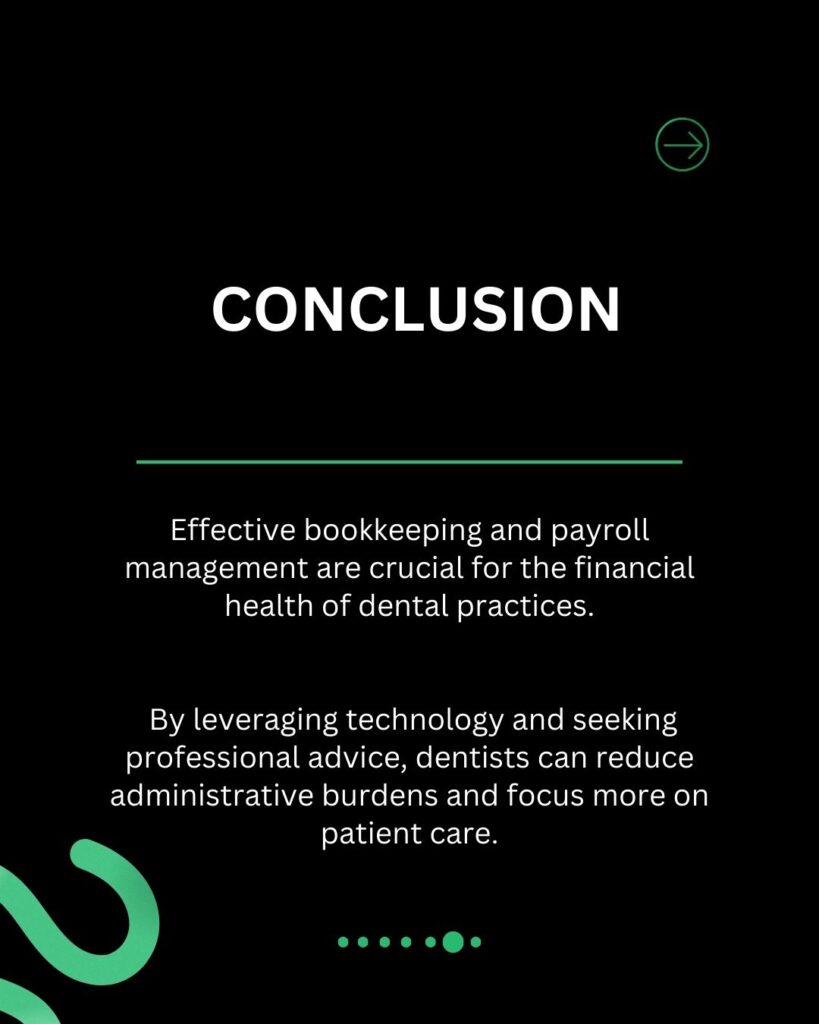
Our Expert Opinion
“As an accountant who has been working with dentists for over 20 years, we have seen much change in how book-keeping is done in dental practices. Historically, much of this was done by hand or on excel, but in today’s environment the need to be efficient with one’s time and to be on top of the numbers is imperative.
By doing the monthly bookkeeping accurately, as a dentist you will be able to see the financial trends in your practice, this will then help you make better decisions. These decisions could include increasing prices, reducing costs or looking to improve chair utilisation in your practice. This information can form the foundation of growth for your practice, i.e., should you invest, or should you change the structure of your business – the list is endless, but it’s the numbers that help tell the story.
The key is to implement a system of bookkeeping, so you know each month the numbers, and what is occurring in your practice. Without this, it’s like going on an expedition without a map or a compass.
Having access to up-to-date numbers is essential for any successful dental practice, and with the plethora of options available there is really no excuse to not knowing how you are doing.”

Bookkeeping Tips for Dentists FAQs
Why is bookkeeping important for dentists?
Bookkeeping is crucial for dentists as it ensures accurate financial records, which are essential for tracking income, managing expenses, and maintaining cash flow. It helps in staying compliant with tax regulations, preparing for audits, and making informed financial decisions. Good bookkeeping practices also simplify year-end accounting, aid in budgeting, and reduce the risk of financial errors that could impact the practice’s profitability.
What expenses should dentists track?
Dentists should track a variety of expenses to ensure accurate financial management, including:
- Dental Supplies: Consumables like gloves, masks, and dental materials.
- Equipment: Purchases and maintenance of dental tools and machinery.
- Rent and Utilities: Costs for office space and utilities.
- Staff Salaries and Benefits: Wages, taxes, and benefits for employees.
- Marketing and Advertising: Costs associated with promoting the practice.
- Professional Fees: Insurance, licenses, and association memberships.
How often should I update my financial records?
You should update your financial records regularly, ideally on a daily or weekly basis. Frequent updates help ensure accuracy, keep track of cash flow, and make it easier to spot and address discrepancies early. Regular updates also simplify tax preparation and financial reporting, allowing you to make informed decisions and maintain compliance with regulations.
What accounting software is recommended for dental practices?
Recommended accounting software for dental practices includes Xero, QuickBooks, and Sage. These platforms offer features tailored for healthcare professionals, such as managing income, expenses, payroll, and compliance with tax regulations. They provide user-friendly interfaces, integration with other business tools, and robust reporting capabilities to help dentists maintain accurate financial records and make informed decisions.
How do I stay compliant with tax regulations?
To stay compliant with tax regulations, dentists should maintain accurate and up-to-date financial records, track all income and expenses, and meet key tax deadlines. Regularly review tax obligations, including VAT, PAYE, and corporation tax, and ensure that all filings are accurate and timely. It’s also beneficial to work with a tax advisor who understands the specific tax laws affecting dental practices.
What are the benefits of hiring a professional accountant?
Hiring a professional accountant for your dental practice offers several benefits, including accurate financial management, ensuring compliance with tax laws, and maximizing tax savings through expert advice. Accountants can also help streamline bookkeeping, prepare financial reports, and offer strategic insights to improve profitability. They take the burden of complex financial tasks off your shoulders, allowing you to focus on patient care.
How do I manage cash flow effectively?
To manage cash flow effectively in a dental practice, regularly monitor income and expenses, maintain a budget, and forecast future cash needs. Ensure timely invoicing and follow up on payments to avoid cash shortfalls. Control costs by reviewing expenses and optimizing inventory levels. Keeping a cash reserve for unexpected expenses can also help maintain financial stability. Using accounting software to track cash flow in real-time can further enhance management.
What records should I keep for tax purposes?
For tax purposes, dentists should keep detailed records of income, expenses, receipts, invoices, payroll records, bank statements, and any correspondence with HMRC. It’s also essential to maintain documentation for business expenses, including equipment purchases, rent, utilities, and professional fees. These records should be retained for at least six years to comply with tax regulations and support any tax returns or audits.
How can I avoid common bookkeeping mistakes?
To avoid common bookkeeping mistakes, keep your financial records organized and up to date, regularly reconcile accounts, and use accounting software to automate tasks. Avoid mixing personal and business expenses, and ensure all transactions are accurately categorized. Regularly review your financial statements to catch errors early. Finally, consider working with a professional accountant to help spot potential issues and maintain accuracy.
What financial reports are essential for my practice?
Essential financial reports for your dental practice include:
- Profit and Loss Statement: Tracks income, expenses, and profitability.
- Cash Flow Statement: Monitors the flow of cash in and out of the practice.
- Balance Sheet: Shows assets, liabilities, and equity.
- Accounts Receivable Report: Tracks outstanding patient payments.
- Expense Report: Details where your money is being spent.
These reports help you make informed financial decisions and ensure the financial health of your practice.
How do I handle invoicing and payments?
To handle invoicing and payments efficiently, use accounting software to generate and track invoices, ensuring timely billing. Clearly outline payment terms on each invoice, including due dates and accepted payment methods. Follow up promptly on overdue payments to maintain cash flow. Automating payment reminders and offering multiple payment options can help speed up the process. Keeping accurate records of all invoices and payments is essential for tracking income and managing accounts receivable.
How can I prepare for year-end accounting?
To prepare for year-end accounting, start by reconciling all accounts, including bank statements and credit cards. Review income and expenses to ensure they are correctly categorized and all transactions are recorded. Organize and verify receipts and invoices, and ensure all outstanding invoices are addressed. Generate key financial reports like the profit and loss statement and balance sheet. Lastly, consult with your accountant to finalize tax planning and ensure compliance with all regulations.
What is the importance of regular financial reviews?
Regular financial reviews are crucial for maintaining the financial health of your dental practice. They help you monitor cash flow, track expenses, and ensure that your practice is on target to meet its financial goals. By regularly reviewing financial reports, you can identify trends, address issues early, and make informed decisions. These reviews also ensure compliance with tax regulations and prepare you for year-end accounting, ultimately supporting long-term profitability and growth.
How do I track inventory expenses?
To track inventory expenses in your dental practice, start by recording all purchases of supplies and materials in your accounting software. Regularly update inventory levels to reflect usage and new stock. Implement an inventory management system that tracks costs associated with each item, including purchase price and delivery fees. Conduct periodic physical inventory counts to reconcile records with actual stock levels. Analyzing inventory turnover can also help in managing costs and optimizing stock levels.
What should I do if I find discrepancies in my records?
If you find discrepancies in your records, start by reviewing the entries to identify where the error occurred. Check original documents, such as receipts and invoices, against your records. Reconcile your accounts by comparing your financial statements with your bank and credit card statements. Correct any errors you find and document the changes. If the issue persists or is complex, consult with your accountant to ensure accuracy and compliance with financial regulations.
Learn more: Related Articles
About the Author

Neha Jain
Neha Jain is a skilled content writer with a rich background in business and financial knowledge. With a bachelor’s degree in English Literature and Psychology, Neha has honed her writing skills, furthering her expertise with the Content Writing Master Course (CWMC) at IIM SKILLS and a Content Marketing Certification from HubSpot Academy.
Working alongside our business development experts, Neha specialises in helping accountants, dentists and other healthcare professionals start, scale and sell their businesses.
Reviewed By:
Dental Accounts & Tax Specialists
As dental practice owners ourselves, we know what makes a clinic tick. We have been working with dentists for over 20 years to help manage their accounts and tax.
Whether you’re a dental associate, run your own practice or own a dental group and are looking to save time, money and effort on your accounts and tax then we want to hear from you. Our digital platform takes the hassle and the paperwork out of accounts.
To find out more about how you can save time, money and effort on your accounts and tax when you automate your finances with Samera, book a free consultation with one of our accounting team today.
Dental Accounts & Tax: Further Information
Make sure you never miss any of our articles, webinars, videos or events by following us on Facebook, LinkedIn, YouTube and Instagram.




